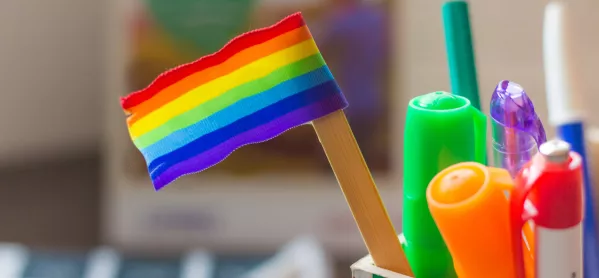Teachers are being urged to do more to help LGBT+ students feel safer at school, including tackling bullying and negative language.
Nearly half (48 per cent) of the 3,000 secondary school students surveyed by charity Just Like Us said they had received little or no positive messaging at school about being LGBT+ in the past 12 months.
And less than three in five LGBT+ students aged 11 to 18 (58 per cent) had felt safe at school on a daily basis over the same period, compared with 73 per cent of their non-LGBT+ peers, the survey found.
Comment: ‘Section 28 still stops me from coming out at school’
Tes Independent School Awards 2021: Wellbeing initiative of the year
News: £750K scheme to target ‘sexual bullying’ in schools
The charity also discovered that for 68 per cent of LGBT+ young people, their mental health had worsened since the pandemic began, compared with half (49 per cent) of non-LGBT+ young people.
Dominic Arnall, chief executive of Just Like Us, said the research was a clear indication that LGBT+ students feel far less safe than their peers. He has called for schools and colleges to demonstrate that LGBT+ students are safe and welcome.
LGBT+ students ‘feel less safe in school’
Mr Arnall noted: “They might be facing bullying or hearing negative language or they might just not see themselves belonging because there isn’t positive messaging from their school.
“LGBT+ young people need to know it’s OK to be themselves in school - especially if they don’t have accepting families at home.”
In the survey, a quarter (25 per cent) of LGBT+ respondents said they were experiencing daily tensions at home. Mr Arnall said if pupils also don’t feel safe to be themselves at school, “that leaves young people in a really difficult situation”.
The study also reveals that students who are lesbian, gay, bisexual or trans are three times more likely to experience unwanted sexual touching than their peers.
The independent study polled 2,934 students aged 11-18 (1,140 of whom were LGBT+) across the UK. When asked what they would like their school to do to support LGBT+ young people, a bisexual Year 13 student from the East of England said: “More LGBT representation taught in classes such as English and history.”
A Year 12 bisexual student from the South West answered: “Literally anything at this point would be good. I just need to be able to express myself and people need to be educated. There is nothing at my school that makes a positive difference to my life. It’s almost as if the government practically forbids schools to teach about LGBTQIA+ and our struggles.”
Meanwhile, a bisexual Year 9 student from the North East added: “Learning about preferred pronouns and gender, as I’m constantly misgendered in school.”
One Year 13 student who identifies as queer from the North East said they would like an LGBT+ club “so we can talk about issues we face and feel supported if we aren’t at home”.
“We know that school staff have been under immense pressure during the pandemic and that’s why we’re doing everything we can to make this easy for schools and colleges,” said Mr Arnall.
Just Like Us will run its annual initiative, School Diversity Week, from 21 to 25 June. Its free resources are available to primary schools, secondary schools and colleges.
“We really want to help LGBT+ pupils feel as safe as their peers. If you see these stats and you are concerned for the safety of your LGBT+ pupils who are disproportionately struggling, please get in touch with Just Like Us and we can help,” said Mr Arnall.




